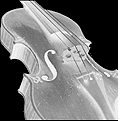

 Associate
Professor Lewis Nielson's Year of Living Dangerously Associate
Professor Lewis Nielson's Year of Living DangerouslyLewis Nielson, associate professor of composition, won honorable mention in the International Society of Bassists Composition Competition 2000 for his Duo Concertant ("Danger Man"), a work for double bass and percussion. More than 35 pieces from all over the world were under consideration in the category, which covered works for solo bass or bass with one other instrument. The compositions receiving honorable mention were "breaking new ground, expanding and extending the use of the instrument and challenging to play," says Robert Black, chair of the judging committee and associate in double bass at the Hartt School. Also on the jury were Joseph Guastafeste of the Chicago Symphony and Hans Sturm, professor of bass at Ball State University. The contest is held every two years; only one first prize is awarded. In January, Nielson received a Center for New Music commission from the University of Iowa to write a brass quintet for the Iowa Brass Quintet. In March, his White Vision (the horizon divides) for violin and piano was performed in New York at the American Composers Alliance Spring Concert. In April Nielson presented a lecture, "Tone Color, Function, and Structural Implications of Unconventional Performance Techniques in Contemporary Music," at the annual conference of the Brazilian Association for Research and Graduate Studies in Music. He also conducted an ensemble of low-strings players that included members of the faculty of the Federal University of Brazil and of the Sao Paolo Philharmonic. The concert program included the Gubaidulina bassoon concerto and two of his own works: Around...Among...Within, a bassoon solo, as well as his Duo Concertant ("Danger Man"). "The piece (Duo Concertant) has some hard harmonics for the bass player," explains Nielson. "So the intent (of the title) is a warning: ‘watch out! danger, man.'" Nielson's long list of honors and awards includes a Fulbright-Hays grant and grants from the National Endowment for the Arts and Meet the Composer. His works have been performed by, among others, the Czech Radio Symphony Orchestra and the Moscow Radio Symphony Orchestra and at such venues as Musique Expèrimentale de Bourges, the Smithsonian Institution, the National Gallery of Art, and the World Saxophone Congress. Vortex: Music by Lewis Nielson, is available on the ACA Digital label. « Professor of African-American Music Wendell Logan, the chair – and architect – of Oberlin's jazz-studies program, says one of his favorite aspects of composing is "completing a work and having it played." In that sense, February might qualify as his favorite month. Logan's Doxology Opera: The Doxy Canticles, received its world premiere in February at Chicago's Museum of Contemporary Art. The large music-theater piece is based on historic events in the South and invokes a young woman's search for spiritual balance in the world. The opera is the first project on which Logan worked with librettist Paul Carter Harrison.  Co-presented
by the Center for Black Music Research (CBMR), the project has preoccupied
Logan since 1995. "The music represents a synthesis of my musical
influences," he says. "Long meter hymns and chants of the
African-American church, jazz, blues, and the Euro-American ‘classical'
tradition." Co-presented
by the Center for Black Music Research (CBMR), the project has preoccupied
Logan since 1995. "The music represents a synthesis of my musical
influences," he says. "Long meter hymns and chants of the
African-American church, jazz, blues, and the Euro-American ‘classical'
tradition." The performance also featured internationally acclaimed mezzo-soprano Bonita Hyman, soprano Elizabeth Norman, a 12-woman chorus, and the CBMR New Black Music Repertory Ensemble, conducted by artistic director Coleridge-Taylor Perkinson. The commission was made possible by a grant from the Meet the Composer/Reader's Digest Commissioning Program, in partnership with the National Endowment for the Arts and the Lila Wallace-Reader's Digest Fund. The Oberlin Jazz Faculty Octet performed his Gullah Island Suite in Cleveland's Severance Hall in February as part of the Cleveland Musical Arts Society's Jazz Showcase. Inspiration for the suite, originally commissioned by Cuyahoga County Community College for the Tri-C Jazz Festival, came from his visits with the Gullah people of Southeast Georgia, descendants of West Africans. "I grew up around them," says Logan. "Their spirit as well as their music motivated me." Logan's childhood holds many touchstones for the composer he would become. "I grew up in a musical environment and I knew, at a very early age, that I wanted to pursue music in my life." A portrait of the artist as a young boy shows him working with Tinkertoys and Erector sets. "There was something about putting those pieces together – which is how I view composition, putting pieces together." He was also fortunate to have had "a very supportive music theory teacher"– Mrs. Johnnie Lee. She suggested he consider choosing composition as his musical path. Logan has at least a dozen ASCAP awards to his credit, a handful from the National Endowment for the Arts, and a Guggenheim Fellowship. He was a fellow at the Rockefeller Center in Bellagio, Italy and he is a recipient of the Cleveland Arts Prize in Music. He has composed more than 200 works that have received performances on three continents. « |